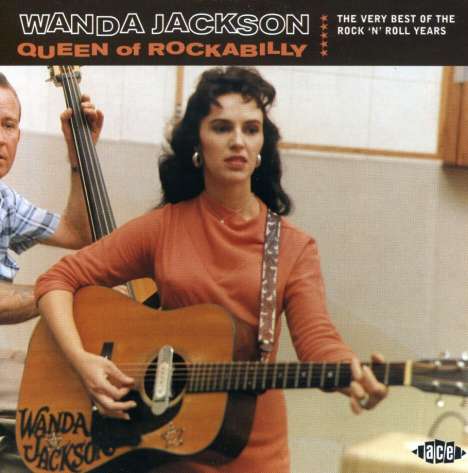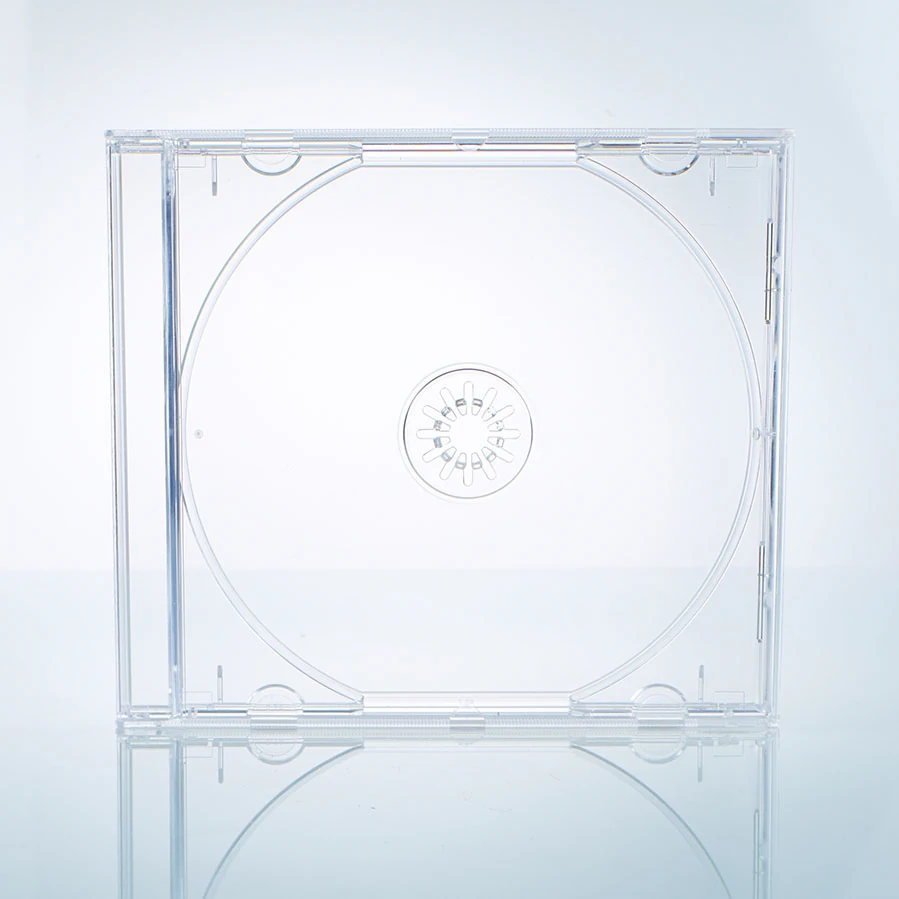Wanda Jackson: Queen Of Rockabilly auf CD
Queen Of Rockabilly
Herkömmliche CD, die mit allen CD-Playern und Computerlaufwerken, aber auch mit den meisten SACD- oder Multiplayern abspielbar ist.
(soweit verfügbar beim Lieferanten)
- Label:
- Ace
- Aufnahmejahr ca.:
- 1956-93
- Artikelnummer:
- 3039076
- UPC/EAN:
- 0029667177627
- Erscheinungstermin:
- 28.8.2000
Weitere Ausgaben von Queen Of Rockabilly |
Preis |
|---|
Wanda Jackson was a maverick - the first and only white female rocker with attitude. Raven-haired and heavy-lidded, Jackson dared you to believe there was something deliciously forbidden about a wild rock'n'roll tune like Mean Mean Man, not least because she recorded so few of them in a career that took her from country to rock'n'roll then back to country again. Though it's not readily apparent or commonly perceived, Wanda Jackson broke the mould in more ways than one.
When producer Ken Nelson signed Wanda to Capitol in the spring of 1956, Elvis was on the brink of global stardom. Wanda had toured the South with him back in 1955 when he was a little-known but promising newcomer on the Sun label. At that time, they shared the same booking agent, Bob Neal of Memphis, and continued to cross paths on hillbilly package tours until early 1956.
Usurped by rock'n'roll, traditional country music was in a state of flux as it began to embrace, somewhat reluctantly, its bastard off-shoot, rockabilly. Wanda appears to have allowed herself to be marketed (in an unwritten, even unspoken, way) as a kind of female counterpart to Elvis, a clear indication of the way record industry minds were working during this time of uncertainty. It seemed to make sense. She and Elvis shared the same sultry physical appeal and, as Colin Escott put it, "like Elvis, her sensuality was coupled with a beguiling awshuckiness."
Wanda was caught between her love for country music and the need to stay commercial. At 19, she was certainly young enough to go with the flow and, more importantly, unlike virtually every other white female vocalist, she had a natural feel for rock'n'roll. She maintains that it was Elvis who advised her to dip her toes in the choppy waters of rock'n'roll as early as 1955. "He kept saying, 'You can do this, I can tell. You've got the kind of voice for it, and you've got the feel.' He took me to his home in Memphis and we went through his record collection of black blues."
Between 1956 and 1959, Jackson was almost permanently on the road. As is evident from contemporary show bills, Wanda toured alongside most of the leading figures in 50s rockabilly and country music, the distinction between the two having become somewhat blurred at this time.
Though her records were frequently played, Wanda had yet to make much impression on the national charts. It may have been because she was too unorthodox for a traditional country music audience used to the gentle trill of Kitty Wells and Jean Shepard, and a shade too raunchy for a teenage audience who found mild lasciviousness from a female a little hard to take, even though a male rocker like Jerry Lee Lewis or Little Richard could get away with it. Most of her singles during this time coupled a classic rocker with a country song.
Wanda broke with tradition in other ways. Around the time she signed with Capitol, Wanda cast aside her Western outfits and adopted a glitzy new look involving slinky dresses, high heels, long earrings and heavy make-up, all of which helped to accentuate her femininity.
"I was really a maverick" she recalls, "I was trying to put some glamour and sex appeal into country music when it wasn't the done thing. My manager was doing his best to get me to just wear skirts and sweaters. He said, 'You should look just like the people in the audience.' I said, 'no, I think they come to see someone look a little different than the girl next door'. It helped establish me and set me apart."
Though not a hit in the States, the song Fujiyama Mama became a major hit in Japan in late 1958, despite (or because of) its references to Nagasaki and Hiroshima and (for the time) some outrageous sexual imagery.
In January 1958, Wanda's booking agent and manager Jim Halsey was approached by Bobby Poe & The Kats, a mixed race rock'n'roll band out of Arkansas. They were offered the task of working as Wanda's road band and in April 1958 they spent four days recording with her at the Capitol Tower in Hollywood. The sessions spawned Mean Mean Man, Let's Have A Party, Long Tall Sally, Money Honey, Rock Your Baby (all heard here) as well as a slew of country songs all of which appeared on her debut LP.
Further dangerous singles such as Rock Your Baby and Savin' My Love came and went, and Wanda was beginning to mildly despair at her lack of chart success. "I had already given up on the rock stuff," she explained. "I had talked to Ken Nelson and told him I wanted to go back to doing just country. Then a deejay in Des Moines, Iowa, started playing Let's Have A Party off my first album and got such a tremendous reaction to it that he contacted Capitol and they agreed to put it out on a 45."
Let's Have A Party reached #38 on the Hot 100 in the autumn of 1960, revitalising Wanda's career at a time when she was beginning to doubt whether she would ever fulfil her potential. Wanda milked it for all it was worth, changing the name of her band to the Party Timers and cashing in with an album titled There's A Party Going On. Unlike many artists on their first hit, Wanda at 23, had six years of experience behind her and was ready and primed to take advantage of the break when it came.
In early 1961, she notched up a Top 30 pop hit with Right Or Wrong and followed through with another Top 30 record, In The Middle Of A Heartache, both country weepers she had written herself. (Five of the rock'n'roll tunes on this CD also came from her pen.) Wanda became a permanent fixture on the country music scene in the 1960s, cutting many more albums and singles for Capitol. When her career waned in the mid-70s, Wanda battled and conquered severe alcohol dependency and is now a born-again Christian with a special interest in Gospel music.
The European rockabilly craze of the late 70s and early 80s brought renewed interest in the records Wanda had made in the days when she showed true maverick spirit by daring to out-rock the boys. "Europe," she says, "was entirely responsible for reviving my secular career." In 1989, Let's Have A Party was featured in the movie "Dead Poets Society". She continues to make the occasional recordings and divides her time between performing gospel music in her home country and belting out rockabilly in Europe where she retains a strong following. All her classic rock'n'roll sides are packed full to bursting onto this blistering (and long awaited) CD, affirming her status as the Queen of Rockabilly.
Rezensionen
F. Schöler in Stereo 11/00: "Die meisten dürften ihren Namen heute mit dem Hit "Let's Have A Party" identifizieren, den sie 1958 mit Gene Vincent und seinen Bluecaps aufgenommen hatte. Vom selben Kaliber ist aber mindestens ein Dutzend weiterer unter den 30 Aufnahmen dieser vorzüglichen Kompilation. Exzellent überspielt, ist das derzeit die beste Retrospektive ihrer Rockabilly/ Rock 'n' Roll-Jahre."Disk 1 von 1 (CD)
-
1 Baby loves him
-
2 Mean Mean Man
-
3 Fujiyama Mama
-
4 Cool love
-
5 Honey bop
-
6 I gotta know
-
7 Let's Have A Party
-
8 Money, Honey
-
9 Long tall Sally
-
10 Hot Dog, That Made Him Mad
-
11 Searchin'
-
12 Savin' my love
-
13 Kansas City
-
14 Hard headed woman
-
15 Tunnel of love
-
16 My baby left me
-
17 Sticks And Stones
-
18 Who Shot Sam
-
19 There's a party goin' on
-
20 Brown eyed handsome man
-
21 You Don't Know, Baby
-
22 Tongue tied
-
23 Riot in cell block
-
24 Slippin' and slidin'
-
25 Fallin'
-
26 Rip it up
-
27 Rock your baby
-
28 Whole lotta shakin' goin' on
-
29 Honey don't
-
30 Man, We Had A Party







